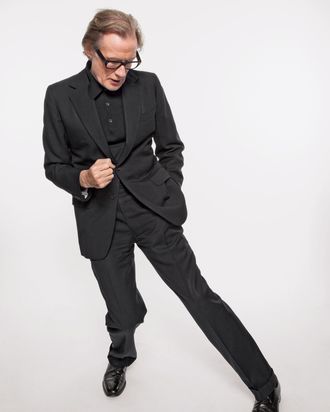
On a slow Thursday night at Picholine, the Upper West Side’s Michelin-starred gem of foam and fromage, Bill Nighy ambles into the kitchen. “Completely sensational,” he tells Terrance Brennan, “and I’m not blowing smoke up your — you know.” Brennan is shaggy, dressed in whites, bouncy and compact — nothing like the gangly British chef-owner Nighy is about to portray several blocks south at the Golden Theatre, when David Hare’s Skylight opens on April 2. Like his character, the actor is so vanishingly wry that friends on the phone have mistakenly apologized for waking him. In the kitchen, he risks mussing a black Anderson & Sheppard tailored suit and a knit tie as dark as purple gets.
“You’re in a play right now?” Brennan asks. “Yeah, it’s with Carey Mulligan. It’s a great play,” says Nighy. The revival of Hare’s intense story of a couple separated by age, politics, marriage, and death was a hit in London last year. “I play a very rich, very self-aggrandizing restaurateur, and I spend all evening trying to get my girlfriend back.”
“So it’s a comedy,” Brennan says.
“Yeah, it’s a little bit funny, a little bit sad, a bit romantic. But nobody suffers.”
“Except the audience,” Brennan jokes.
“No, except me,” says Nighy. “I suffer on your behalf. Like you do here,” he adds. Nighy has popped in for a five-course tasting-menu dinner, a rare delight even for an actor prominent enough to have upstaged Hugh Grant in Love Actually (as washed-up rocker Billy Mack) and vamped in CGI tentacles for Pirates of the Caribbean, and who just reprised his starring role opposite a couple of Dames in The Second Best Exotic Marigold Hotel.
Nighy’s co-star spends the first act of Skylight whipping up spaghetti Bolognese from scratch, for real. “The audience is slavering,” Nighy tells Brennan. The dish becomes an instrument in the power struggle between Mulligan’s Kyra and Nighy’s Tom. “I say, ‘Well, are you — are you putting the chile in first?’ ” Nighy says, pointing two dramatic fingers at the imaginary dish. “I say, ‘Fry the chile, so that it infuses the oil first.’ And she says, ‘Yeah, I’m not doing it; I’m doing it the way I like doing it.’ ” Brennan laughs and says, “I just had a flashback. When I was working in Paris, I lived with this French girlfriend, and she was instructing me how to eat a salad. I thought, ‘This isn’t gonna last very long.’ And it didn’t.”
Nighy may cut a sophisticated figure, but he’s somewhat out of place here. His London home has no oven; his dinners tend to be takeout or tables for one in a few Thai and Italian joints. He’s never had ceviche before tonight, much less kinmedai ceviche in a grapefruit broth with tobiko and shaved winter radish. Like go-getter Tom, Nighy is self-made — the son of a mechanic and a nurse in middle-class Surrey. “When I was very young, I used to play working-class characters, and then I made the middle class,” Nighy says, his fingers frantically tapping the table. “Then I would play academics — because maybe I look smart, maybe I’ve got one of those faces. Which would please me, because I have virtually no education.”
In fact, he ran away from home twice. He set out for “Persia” at age 15, but gave up near Marseille. Then, after barely graduating, he headed for Paris “in order to write the great English paragraph” — and didn’t. A girlfriend persuaded him to go to drama school.
Now he’s enough of a name to pull a Picholine server out of character. “You made me cry in one of your last movies,” a waiter tells him. “About Time — that scene on the beach with the son, it was really special.” That time-travel romance was made by Richard Curtis, the writer-director who gave Nighy his biggest break in 2003. “Love Actually made it unnecessary for me to audition,” he says. Before its release, he was a staple of top-shelf British theater and TV (usually playing “shabby, lanky messes, men on the verge of falling apart”), but considered himself a journeyman. His first theatrical lead was in the original production of Skylight, 18 years ago. (The character is supposed to be 50, 20-plus years older than the female lead; at 65, he still carries it off.) Asked how his performance is different this time, he shrugs. “I’m like a goldfish. I have no sense memory at all of having performed it before.”
Skylight originally starred Michael Gambon — a performance Nighy considers “the greatest time I’d ever had in a theater.” But when Hare asked him to replace Gambon, Nighy said no. “I invented it as being outside of my range,” he says, “which has been a bad habit of mine.” He used to lie to his agent. “I’d invent all kinds of quite complicated reasons why [a part] didn’t suit me, but in fact all it was, was that I thought I couldn’t pull it off.” Hare had to call Nighy and talk him into it. “I regret that way of greeting the day,” says Nighy, “but I’m working on it. I’ve had some victories over that kind of thinking.”
Over a sea scallop garnished with foie gras, Nighy declines to discuss other regrets. More than 20 years sober, he is quiet about his years of drinking, and about his 2008 separation from actress Diana Quick after 27 years. He does talk energetically about what sounds like a rather solitary life. “I get really excited about things that I observe other people don’t get excited about. Food — not anything fancy, though this is fabulous, obviously. Walking and reading and listening to music and drinking coffee. And trees drive me mental. I’m one of those guys — I mean, they drive me insane.” He’s become more comfortable dining alone with a book. “I’ve been breaking all kinds of barriers — reading in restaurants that I’d previously declared unreadable in.”
In fact, introvert-cool is something of a signature for Nighy, whose acting is at once neurotic and magnetically assured. Even admiring critics cite his penchant for tics and affectations. A gushing Guardian review of Skylight praised Mulligan’s naturalism before stating, “No one could accuse Nighy of being natural.” When I mention this, he bristles. “Well, that’s what I’m like, that’s what I do,” he says. Take, for instance, his notable habit of gesturing with two fingers out. People tell him, “I like that thing you do with your hands,” without realizing he has a condition called Dupuytren’s contracture, which leaves the last two fingers of Nighy’s hands permanently curled in.
“I think that everything I do is in the name of making the play clear, and that’s my form of naturalism,” he says. “I am smiling as I say that, because it’s probably bullshit.” His favorite actor happens to be the famously mannered Christopher Walken, whom he got to work with on a British TV spy thriller written by Hare. “He has grace,” says Nighy, “and everything he does is poetic.” When Nighy heard Walken was on Broadway, in 2010’s A Behanding in Spokane, he flew to New York just to see it.
Nighy plans to spend his New York days stalking independent bookstores and café-hopping as he burns through the oeuvre of Virginia Woolf. Also, “I’m going to count the trees in Central Park.” He was 46 the first time he visited the city (“It took me half my life to get anywhere”), and it was just as he’d imagined it from the movies. But his favorite New York memory involves his only other appearance on Broadway, starring in Hare’s The Vertical Hour in 2006.
It was the night after the opening. “I was being driven home from the theater,” he says, “and I stopped for M&M’s — because you have so many more colors here than at home. I came out of the sweet shop carrying all this stuff, and I got into the car and my driver was playing Barry White — I previously had no relationship with Barry White — and somehow from the shop to the car, the true realization that we’d opened the play came upon me and I was swamped with a blissful feeling. I’m not very good at happiness apparently, but relief, I can do.”
Tonight, he forgoes the sweets, as well as the coffee: “If I ever find myself making remarks that I might to any degree regret,
it was the third cup of coffee.” After saying his good-byes to the staff, he reaches out for a handshake. “Shall I wander?”
*This article appears in the March 23, 2015 issue of New York Magazine.





